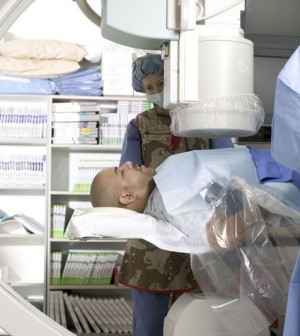- 7 Best Breads for Maintaining Stable Blood Sugar
- Gelatin vs. Collagen: Which is Best for Skin, Nails, and Joints?
- The Long-Term Effects of Daily Turmeric Supplements on Liver Health
- Could Your Grocery Store Meat Be Causing Recurring UTIs?
- Are You Making This Expensive Thermostat Error This Winter?
- Recognizing the Signs of Hypothyroidism
- 10 Strategies to Overcome Insomnia
- Could Artificial Sweeteners Be Aging the Brain Faster?
- Techniques for Soothing Your Nervous System
- Does the Water in Your House Smell Funny? Here’s Why
Iressa Approved for Specific Late-Stage Lung Cancer


Iressa (gefitinib) has been approved by the U.S. Food and Drug Administration to treat people with late-stage (metastatic) non-small cell lung cancer (NSCLC) with a specific genetic mutation.
A just-approved diagnostic method can identify patients who could benefit from this new use, the FDA added Monday in a news release.
Lung cancer is the leading cause of cancer death in the United States, the agency said. Though more common among men, the number of deaths from lung cancer in women is rising. More than 220,000 Americans are likely to be diagnosed with lung cancer this year, and the disease will kill an estimated 158,000 people, the National Cancer Institute projects.
NSCLC is the most common type of lung cancer, and about 10 percent of NSCLC cases are caused by the mutated EGFR gene, the FDA said.
Iressa is among a class of drugs called kinase inhibitors, which are designed to block proteins the spur development of cancer cells. The therascreen EGFR RGQ PCR Kit is a newly approved diagnostic that can help doctors detect people with the genetic mutation who are candidates for treatment with Iressa.
Iressa was evaluated for this use in clinical trials involving 106 people with previously untreated, EGFR mutation-positive metastatic NSCLC. Tumors shrank in about 50 percent of people treated with Iressa 250 milligrams once daily. This effect lasted an average of six months, the FDA said.
Severe side effects of Iressa may include interstitial lung disease, liver damage, gastrointestinal damage, severe diarrhea and vision disorders. More common side effects are diarrhea and skin reactions.
Iressa, initially approved in 2003 for a different type of NSCLC, was later voluntarily withdrawn from the market after post-approval trials failed to verify a clinical benefit, the FDA said.
Iressa is marketed by Wilmington, Del.-based AstraZeneca. The therascreen diagnostic is manufactured by Qiagen Manchester Ltd., based in the United Kingdom.
More information
Visit the FDA to learn more.
Source: HealthDay
Copyright © 2026 HealthDay. All rights reserved.










